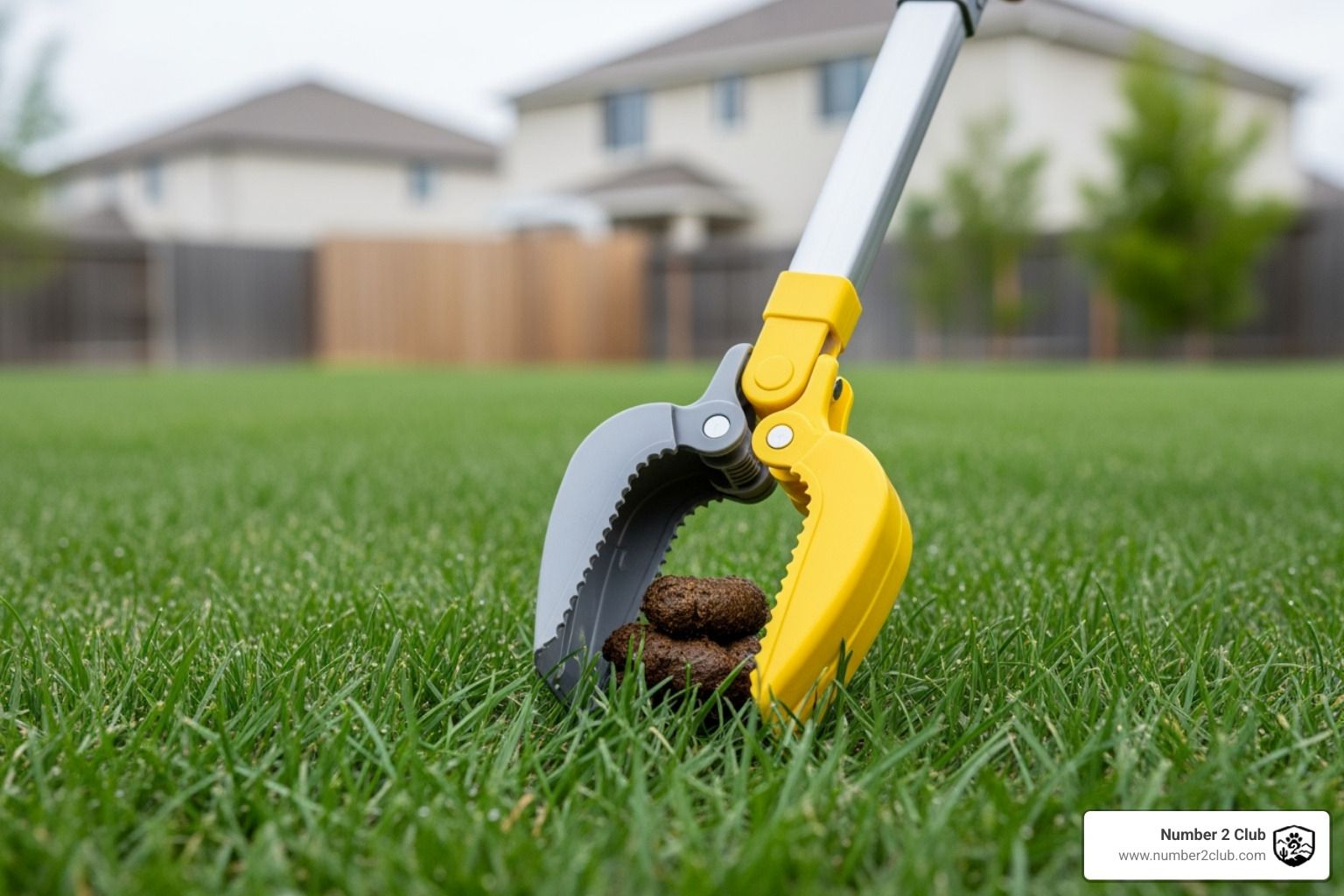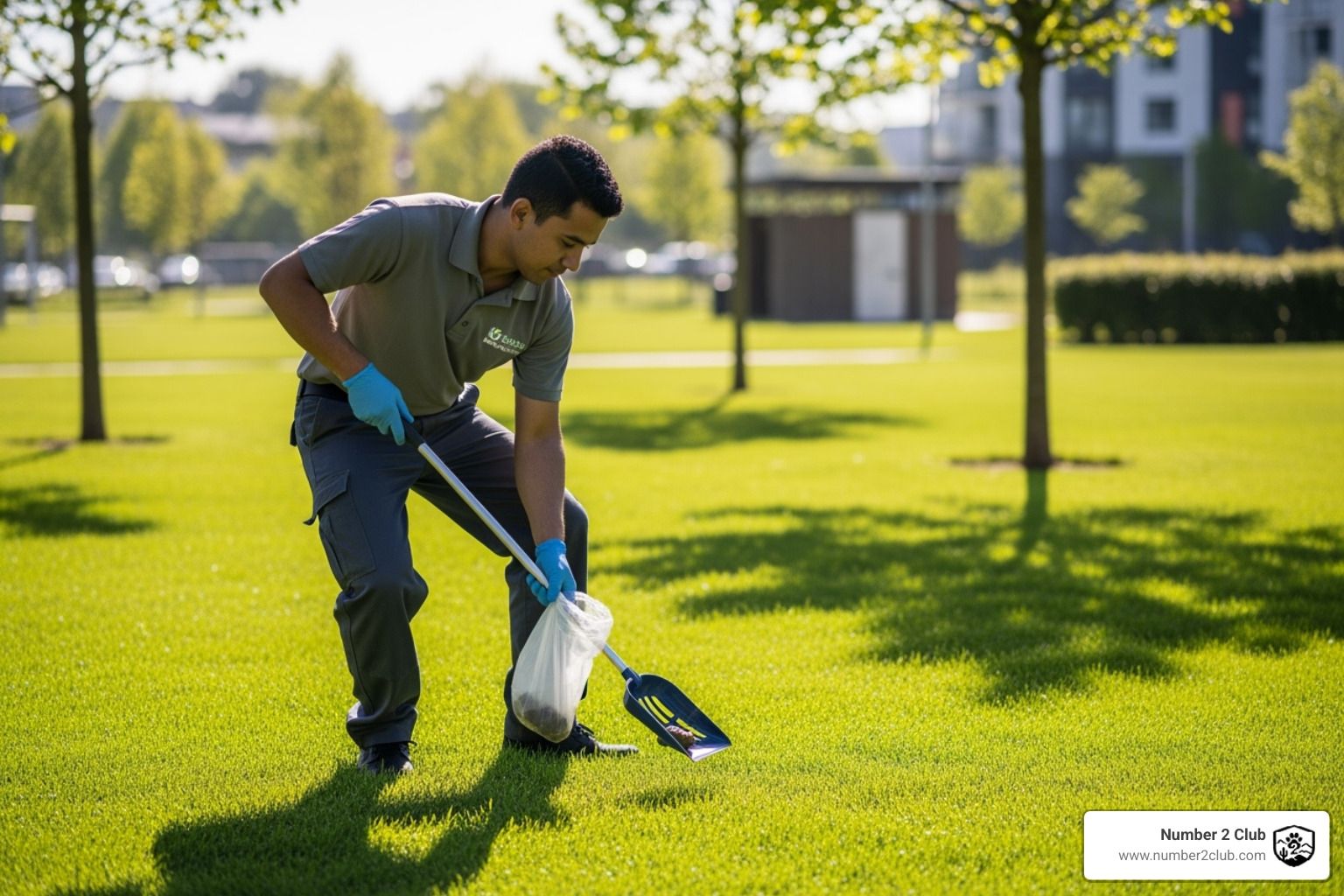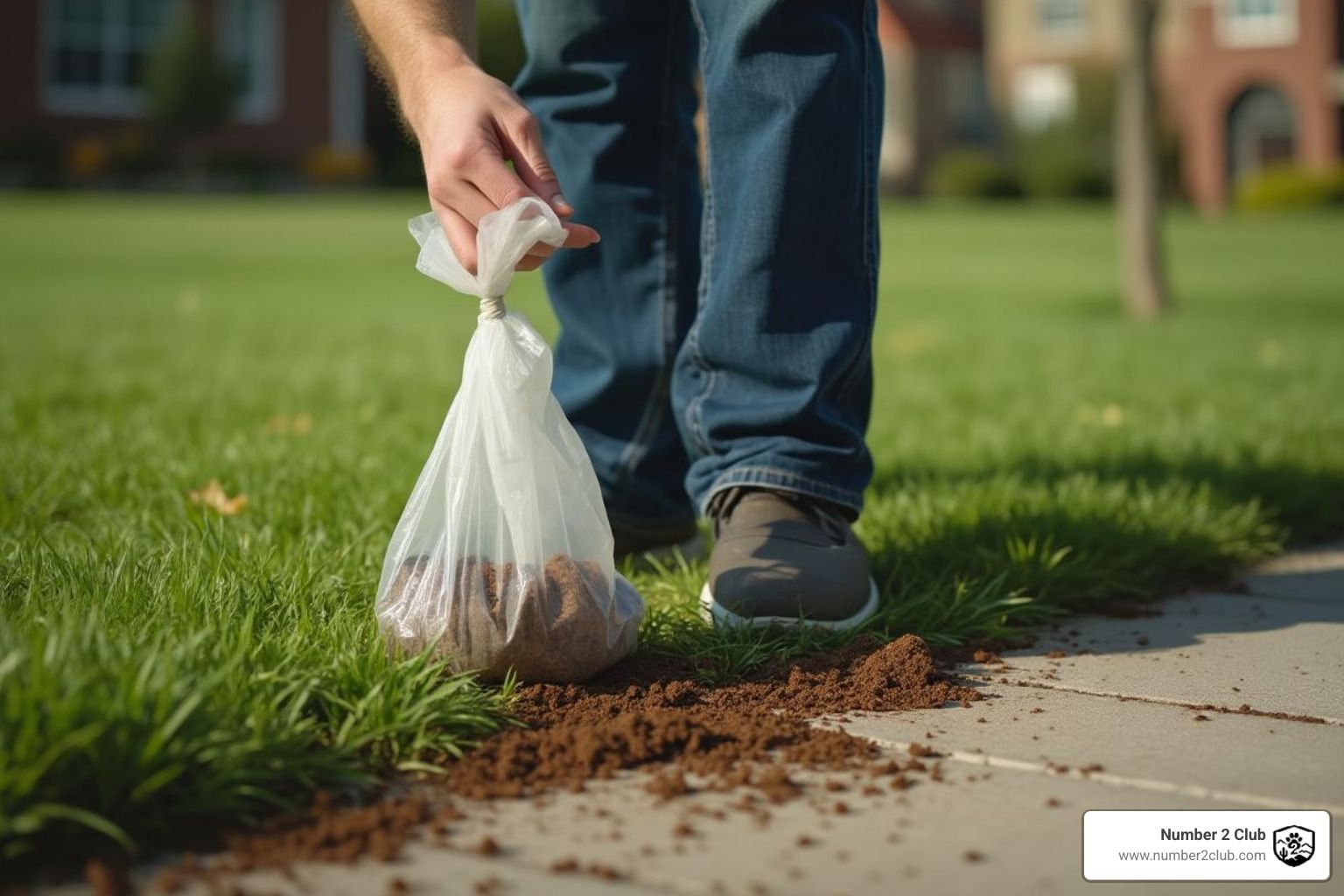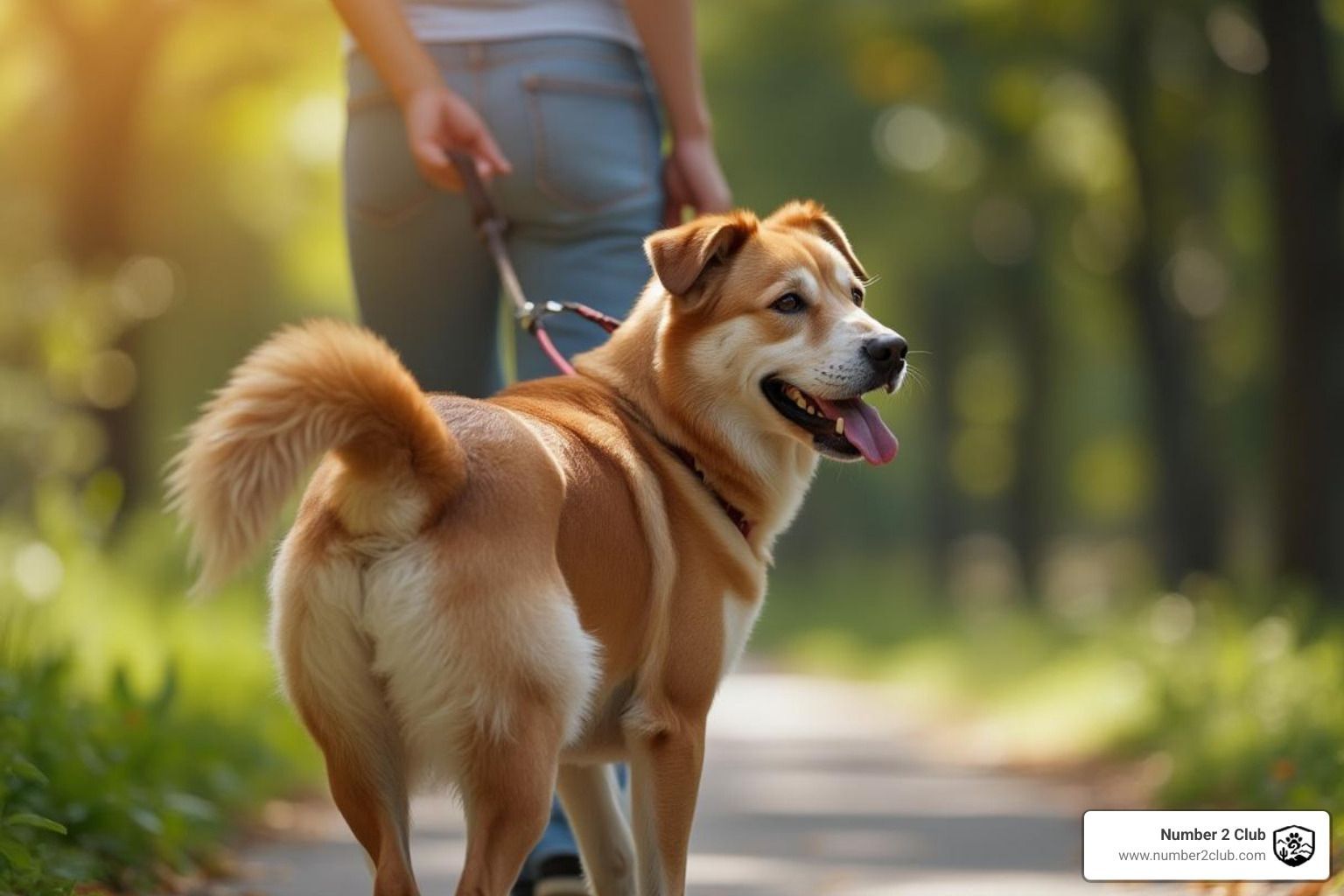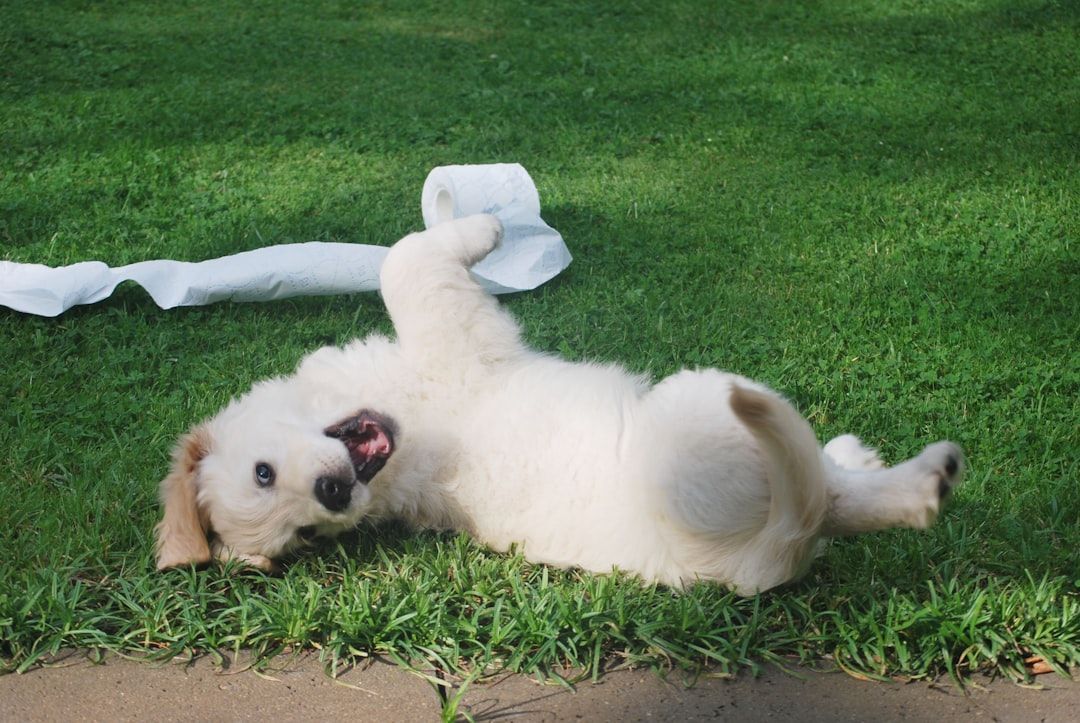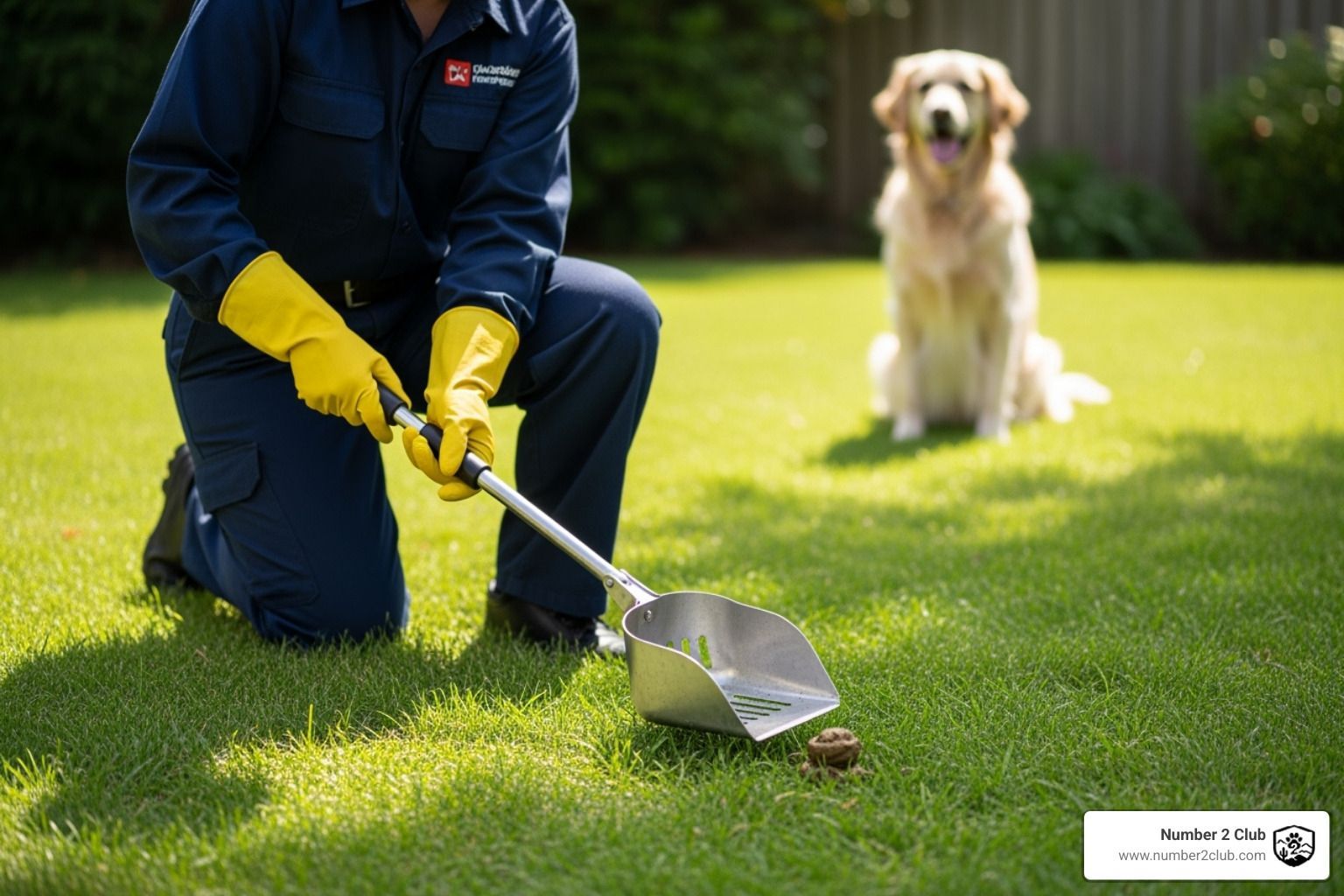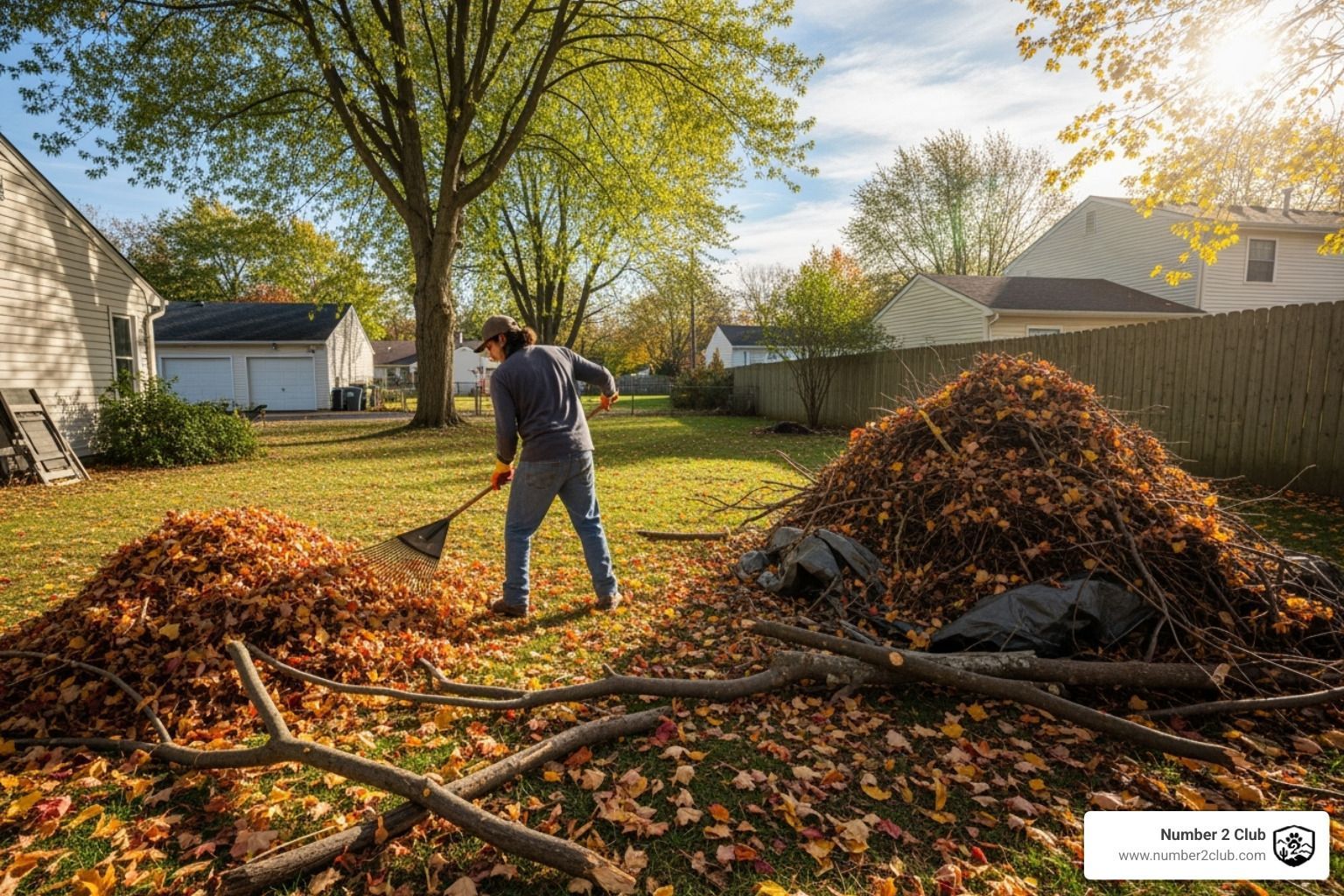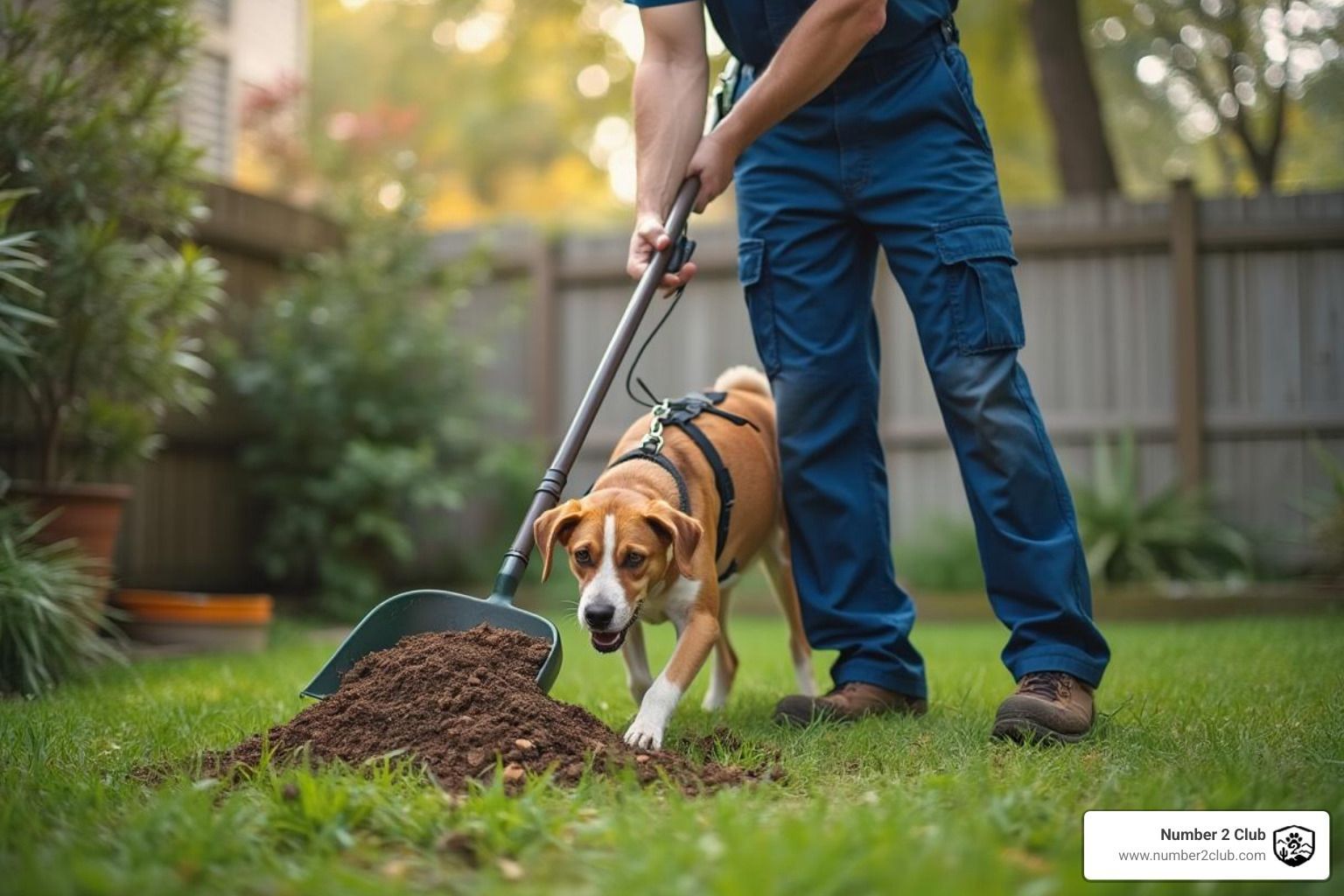Scoop the Poop Without the Oops – Backyard Dog Poop Cleaning Tips
Why Backyard Dog Poop Cleaning Matters
If you're looking for the best way to clean up dog poop in your backyard, here's a quick answer:
- Pick up waste daily using a long-handled pooper scooper
- Dispose in sealed bags in your trash can
- Use biodegradable bags to reduce environmental impact
- Clean up before rain to prevent water contamination
- Consider a designated potty area to make cleanup easier
Backyard dog poop cleaning is one of those necessary but often dreaded tasks that comes with dog ownership. The average dog produces about three-quarters of a pound of waste each day—that's approximately 274 pounds per year! This isn't just an aesthetic issue; dog waste contains harmful bacteria like E. coli and salmonella, along with parasites that can spread to humans and other pets.
Unlike livestock manure, dog waste is highly acidic and can actually kill grass rather than fertilize it. When left in your yard, it can take up to a year to decompose naturally while posing serious health risks to your family and pets. Even worse, rain can wash these contaminants into local waterways, as dog feces ranks as high as third on the list of contributors to contaminated water.
Setting up a regular backyard dog poop cleaning routine is essential for maintaining a healthy outdoor space. Whether you opt for the traditional bag-and-scoop method, invest in specialized tools like a rake-and-tray system, or hire a professional service, consistent cleanup prevents disease spread, eliminates unpleasant odors, and keeps your lawn looking its best.
I'm Joseph Lopez, a pet care specialist with over 8 years of experience in backyard dog poop cleaning services and developing efficient waste management solutions for residential properties. I've helped thousands of homeowners maintain clean, safe yards for their families and pets.

Why You Must Clean Up Every Pile
Let's be honest—scooping poop isn't anyone's idea of a fun afternoon. But understanding the real impact of those little brown piles might just give you the motivation to grab that scooper more regularly.
That innocent-looking dog waste isn't just an eyesore or a potential shoe hazard—it's actually classified by the EPA as an environmental pollutant in the same category as toxic chemicals and oil spills. Yes, you read that right! Your sweet pup's "deposits" are officially considered pollution.
Backyard dog poop cleaning matters tremendously because each pile is teeming with harmful pathogens. Would you believe that a single gram of dog poop contains approximately 23 million fecal coliform bacteria? These aren't harmless little microbes—we're talking about dangerous varieties like E. coli, salmonella, and giardia that can cause serious illness in both humans and animals.
The numbers really put things in perspective. The average dog produces about 274 pounds of waste annually. If you're a multi-dog household, you could be looking at over 500 pounds of waste in your yard each year! And with studies showing that roughly 40% of Americans regularly skip picking up after their dogs, the collective impact on our environment is staggering.
The Hidden Dangers Lurking in Your Grass
When dog waste sits in your yard, it creates a virtual playground for parasites and bacteria. These nasty organisms don't politely stay put in the poop—they migrate into your soil where they can remain viable for years.
Your beautiful lawn could be harboring roundworms (whose eggs survive in soil for up to four years), hookworms (which can actually penetrate human skin on contact), whipworms (causing severe intestinal problems if accidentally ingested), and giardia (a microscopic parasite that leads to unpleasant digestive issues).
These parasites pose a special risk to children who play in the yard and might touch their mouths without washing hands first. But adults aren't off the hook either—gardening without gloves in contaminated soil is a common route for infection.
The zoonotic pathogens in dog waste—diseases that jump from animals to humans—aren't just theoretical concerns. Research has consistently shown that areas with high concentrations of dog waste have higher incidences of certain illnesses in the local population. That's a connection we simply can't ignore.
Laws, Fines, and Being a Good Neighbor
Backyard dog poop cleaning isn't just about health—it's often a legal requirement. Many cities, counties, and homeowners associations have specific regulations about pet waste removal, with fines ranging from $50 to several hundred dollars if you're caught neglecting your duty.
Even without explicit laws, there's the matter of simply being considerate. Unattended dog waste creates unpleasant odors that don't respect property lines, attracts flies and pests that affect everyone nearby, and makes shared spaces unpleasant or downright unusable.
Perhaps most concerning is what happens when it rains. Water rushing over uncollected dog poop carries those millions of bacteria per gram into storm drains, which typically flow directly into local waterways without treatment. The EPA has identified this runoff as a significant source of water pollution , leading to beach closures, fish kills, and harmful algae blooms that damage entire ecosystems.
Taking responsibility for backyard dog poop cleaning is simply part of the social contract of dog ownership. It's one of those small actions that, when everyone participates, makes a huge difference for community health and environmental protection. If you have questions about proper disposal methods or local regulations, check out Number 2 Club's FAQ page for helpful guidance.
Backyard Dog Poop Cleaning Methods: Tools & Techniques
Now that we understand why backyard dog poop cleaning is so important, let's talk about how to do it effectively. Having the right tools and techniques can transform this necessary chore from a dreaded task into just another part of your routine.

Choosing the Right Gear for Backyard Dog Poop Cleaning
The secret to making backyard dog poop cleaning more bearable starts with having the right equipment. Think of it like any other household task – the right tools make all the difference!
For most dog parents, a good quality pooper scooper is worth its weight in gold. Spring-loaded scoopers are perfect if you're cleaning up from harder surfaces like patios or gravel, while spade-style scoopers work wonders for lifting waste from grass without damaging your lawn. If you've got a thick lawn, consider a wire rake scooper that can steer between grass blades without leaving anything behind.
Families with multiple dogs often find rake and tray systems to be lifesavers. These tools – essentially downsized versions of horse stable equipment – let you efficiently rake and collect waste without bending over repeatedly or pulling up chunks of grass. Your back will thank you!
When it comes to bags, Mother Earth will appreciate you choosing biodegradable or compostable options. They might cost a bit more upfront, but knowing you're not adding to the plastic problem gives real peace of mind.
Don't forget about protecting yourself! A good pair of disposable gloves creates an important barrier between you and those harmful bacteria we talked about earlier. And for ultimate comfort, look for tools with long handles and comfortable grips made from rust-resistant materials – they'll last longer and keep you at a comfortable distance from the waste.
Backyard Dog Poop Cleaning Step-by-Step
The difference between a frustrating cleanup and an efficient one often comes down to your approach. I've found that working systematically saves time and ensures you don't miss anything.
Start by mentally dividing your yard into a grid pattern. Work methodically from one end to the other, almost like you're mowing the lawn. This organized approach prevents that annoying moment when you spot a pile you missed after you've already put everything away!
If you're going the bag route, try the bag-over-hand technique: turn a bag inside out over your gloved hand, pick up the waste, then pull the bag right-side out around it before tying it securely. This method minimizes your contact with the waste while ensuring everything stays contained.
Here's a pro tip that might sound counterintuitive – if weather permits, let fresh poop dry for a few hours before picking it up. Slightly dried waste tends to stick to itself better and comes up more cleanly than fresh deposits.

After your initial pass, take a moment to walk the yard in the opposite direction. This double-check pass often reveals piles that were hidden by grass or shrubs on your first go-round. And if you want to make spotting easier, schedule your backyard dog poop cleaning session for early morning or late afternoon when the sun is lower – the longer shadows make piles much easier to spot!
Backyard Dog Poop Cleaning for Soft or Runny Stools
Let's be honest – dealing with diarrhea or soft stools is probably the least pleasant part of dog ownership. But with a few tricks, even this challenge becomes manageable.
When faced with runny waste that seems impossible to pick up completely, try the freeze-spray hack. A quick blast of commercial freeze spray (like Super Cold 134) will temporarily solidify the mess, making it much easier to scoop up cleanly. It's like magic for those otherwise impossible-to-grab messes!
For very loose stools, the paper towel blotting technique works wonders. Simply place a paper towel over the waste first to absorb excess moisture before attempting to scoop. This simple extra step makes cleanup significantly easier.
Sometimes, despite your best efforts, residue remains on the grass. In these cases, a gentle rinse with your garden hose can help dilute and break down what's left. Just be mindful to direct the flow away from water sources and vegetable gardens. For stubborn spots, pet-safe enzymatic cleaners are fantastic for breaking down remaining waste particles while neutralizing those unpleasant odors.
If your pup has frequent loose stools, it might be worth a conversation with your veterinarian. Chronic digestive issues can indicate dietary problems or health concerns that deserve attention – plus, solving the underlying issue will make your backyard dog poop cleaning routine much easier!
| Method | Pros | Cons | Best For |
|---|---|---|---|
| Scoop-and-Bag | Portable, inexpensive | Closer contact with waste | Small yards, single dogs |
| Rake-and-Tray | Less bending, no grass damage | Bulkier to store | Multiple dogs, larger yards |
| Vacuum-Style | Hands-free operation | More expensive, needs charging | Mobility issues, frequent cleaning |
With these tools and techniques in your arsenal, backyard dog poop cleaning can become a quick, efficient part of your routine rather than a dreaded chore. And remember, if it ever becomes too much, the Number 2 Club's residential services are always here to help!
From Bag to Bin: Safe, Eco-Friendly Disposal Options
Once you've done the dirty work of scooping, you're faced with an important question: what do you do with all that poop? Let's explore your options for getting rid of your furry friend's waste in ways that are kind to both your nose and Mother Nature.

Biodegradable vs. Compostable Bags – Which Wins?
When it comes to backyard dog poop cleaning, the bag you choose makes a bigger difference than you might think. Let's break down your options:
Those standard plastic grocery bags might be free, but they're environmental troublemakers that can take over 1,000 years to break down in landfills. Plus, they leave behind those pesky microplastics that are causing all sorts of environmental havoc.
Biodegradable bags are definitely a step up. They break down faster – typically within several months under the right conditions – but here's the catch: many still leave behind some microplastics. They're better than regular plastic, but not perfect.
The gold star goes to compostable bags made from plant-based materials like cornstarch. These champions break down completely into natural elements without leaving harmful residues behind. Yes, they might cost a little more upfront, but your grandchildren's planet will thank you!
One tip from the pros: don't be fooled by clever marketing. "Biodegradable" and "compostable" aren't interchangeable terms. Look specifically for proper compostable certification on the packaging to ensure you're getting the real deal.
At-Home Composting & Digesters (Do It Safely)
Contrary to what many believe, dog waste can actually be composted – but before you toss those poop bags into your tomato garden compost, there are some critical rules to follow.
In-ground digesters are like mini septic systems designed specifically for pet waste. You simply bury a container with drainage holes in your yard, add the waste along with special digester enzymes, and let nature do its thing. The liquid gradually seeps into the surrounding soil – just be sure to place it far from vegetable gardens and water sources!
For the ambitious composter, hot composting is an option that follows USDA guidelines. The key is maintaining temperatures of at least 140°F for several days to kill off pathogens. This isn't your casual compost pile – you'll need a separate bin exclusively for pet waste, plenty of carbon-rich materials like leaves or shredded newspaper, regular turning, and a thermometer to monitor temperature. The finished product should only ever grace your ornamental plants, never your vegetable garden.
Some dedicated pet owners even maintain separate worm farms specifically for processing dog waste. The wriggly workers break down the waste quickly, but this method requires careful management and proper carbon balance with materials like cardboard.
Whichever method you choose, the resulting compost should never touch plants that will end up on your dinner plate. Safety first!
What NOT to Do With Dog Poop
When it comes to backyard dog poop cleaning, knowing what not to do is just as important as knowing the right methods:
Never use dog waste as fertilizer for your edible plants. Unlike cow or horse manure, dog waste is too acidic and packed with pathogens that can contaminate your food crops. Trust me, no one wants E. coli in their salad.
Flushing might seem logical – after all, our waste goes down the toilet – but check your local regulations first. Some sewage systems simply can't handle the additional volume, and many localities explicitly prohibit it. When in doubt, don't flush it out.
Keep dog waste far away from storm drains. These typically lead directly to local waterways without any treatment, creating serious pollution problems.
If you're tempted to bury waste, proceed with caution. It should be at least 6 inches deep and positioned well away from vegetable gardens, water sources, and areas where children play. Those pathogens can stick around in soil for years.
Never add dog waste to your regular compost pile, especially if that compost will eventually feed your vegetable garden. Cross-contamination is a real risk that's not worth taking.
And finally, the "if I don't see it, it doesn't exist" approach is definitely not an option. Ignoring waste leads to environmental contamination, neighborhood tensions, and health hazards for everyone.
For most of us, the simplest and safest option remains bagging waste in compostable bags and disposing of it in the regular trash. It's straightforward, effective, and gets the job done without fuss. For those looking for even more convenience, the residential services from Number 2 Club can take this chore completely off your hands.
Make Cleanup Easy Tomorrow: Training, Routine & Odor Control
Let's face it— backyard dog poop cleaning isn't anyone's favorite chore. But with a few smart strategies, you can make tomorrow's cleanup so much easier that it barely feels like work at all!

Training Your Dog to One Spot for Easier Backyard Dog Poop Cleaning
Imagine knowing exactly where to look for your dog's deposits instead of playing a smelly version of hide-and-seek across your yard. That's the beauty of potty-spot training!
Start by choosing the perfect potty zone—ideally somewhere that's away from your barbecue area and vegetable garden but still easily accessible for cleanup. Many pet parents find that a small area with pea gravel or mulch makes backyard dog poop cleaning much simpler than hunting through tall grass.
When it's potty time, lead your pup to this designated area on a leash. Use a consistent command like "go potty" and be patient—nature can't be rushed! When your furry friend does their business in the right spot, celebrate like they've just won a gold medal. Treats, praise, and perhaps a little happy dance will help them connect this location with positive experiences.
Consistency is your best friend here. For the first few weeks, always guide your dog to the same spot. Over time, they'll naturally head there on their own. Some dogs catch on within days, while others might need a few weeks of gentle reminders. Don't get discouraged if accidents happen elsewhere—just calmly redirect without punishment.
For an extra training boost, try adding a visual marker like a decorative stake that helps both you and your dog identify the potty zone. Some pet parents even report success with leaving a tiny bit of scent from previous visits (properly cleaned up afterward, of course) to help reinforce the "this is where the magic happens" message. More info about training spot
Build a Cleanup Routine You'll Actually Follow
The secret to keeping your yard pristine isn't superhuman dedication—it's creating a simple routine that fits naturally into your life. Think of backyard dog poop cleaning like brushing your teeth: quick, regular maintenance prevents bigger problems down the road.
For single-dog households, cleaning every other day is usually sufficient. If you've got a multi-dog family, daily scooping will prevent your yard from becoming a minefield. Always prioritize cleanup before rain—those afternoon thunderstorms can wash harmful bacteria straight into local waterways if you've left cleanup for "later."
Make the process convenient by storing your cleanup tools somewhere easily accessible—perhaps hanging on hooks by the back door or in a decorative bin on the patio. Nothing kills motivation faster than having to dig through the garage for supplies every time.
Try pairing backyard dog poop cleaning with activities you already do. Many pet parents find success with the "scoop & stroll" method—doing a quick yard cleanup right before taking their dog for a walk. The walk becomes the reward for both of you after completing the less enjoyable task!
Family involvement can transform this chore from burden to bonding. Create a simple rotating schedule where everyone takes turns. Even children (with proper supervision and hand-washing afterward) can learn responsibility by helping care for the family pet in this way. When everyone contributes, no one person gets stuck with the dirty work.
For those inevitable forgotten days, set calendar reminders on your phone. A gentle "pre-rain sweep" alert can save you from a much messier situation later. Some families even turn cleanup into a quick game—whoever finds and scoops the most "treasures" in five minutes wins a small prize or gets to choose dinner.
Odor control is another key component of effective backyard dog poop cleaning. After scooping, a quick hose-down of problem areas prevents lingering smells. For stubborn spots, baking soda sprinkled before watering works wonders as a natural deodorizer. In extreme cases, pet-safe enzymatic cleaners can break down remaining organic matter and eliminate odors at their source.
Consider landscape modifications that make maintenance easier. A small section of artificial turf or pea gravel in your dog's favorite area can dramatically simplify cleanup. Ground covers that contrast with your dog's waste make spotting easier, while clear pathways ensure you can access every corner of your yard without trampling your prized perennials.
The most important thing to remember is that consistency makes the job easier. Fresh waste is always simpler to clean up than old, dried-out piles, and a yard that's maintained regularly never becomes overwhelming. With these simple strategies, backyard dog poop cleaning can become just another quick task in your day rather than a dreaded chore you put off until it's unmanageable.
Frequently Asked Questions About Backyard Dog Poop
How often should I scoop my yard?
Let's talk about everyone's favorite question - how often should you really be out there scooping? The truth is, there's no one-size-fits-all answer, but I can help you figure out what's right for your situation.
If you're a single-dog household with a larger yard, every 2-3 days might be sufficient. But if you've got a pack of pups running around, daily cleaning becomes less of a suggestion and more of a necessity. Think of it like dishes - the more people eating, the quicker they pile up!
Your yard size matters too. A smaller space gets "decorated" much more quickly than a sprawling backyard. And don't forget about seasons - summer heat creates a double challenge with faster decomposition but also more odor and flies, while winter might temporarily preserve the evidence until that spring thaw (surprise!).
For families with little ones crawling or playing in the grass, or anyone with immune system concerns, I strongly recommend backyard dog poop cleaning on a daily basis. Those tiny pathogens don't take days off, unfortunately.
Here's a handy rule of thumb I share with my clients: Take the number of dogs you have and divide 7 by that number. That gives you your maximum days between cleanings. So with 2 dogs, aim to clean at least every 3-4 days; with 3 dogs, you're looking at every 2-3 days. Four or more? You're in daily cleaning territory, my friend!
Is dog poop ever good fertilizer?
I hear this myth all the time, and I wish it were true - it would make our lives easier! But I need to be straight with you: dog waste is definitely NOT good fertilizer, despite what your neighbor might claim.
Unlike cow or horse manure (from grass-eating animals), dog waste comes from a high-protein diet that makes it extremely acidic. Rather than nourishing your lawn, it actually burns grass - those brown spots you see aren't from urine alone, but from feces too.
Backyard dog poop cleaning is essential because dog waste contains harmful bacteria and parasites that can linger in soil for years. Would you want those pathogens potentially transferring to your hands while gardening or, worse, contaminating your vegetable garden? Definitely not.
Dog waste is also surprisingly stubborn, taking up to a year to break down naturally in your yard. During that time, it's not turning into garden gold - it's just sitting there hosting a microscopic pathogen party.
If you're looking for natural fertilizers for your garden, you're much better off with properly composted plant materials, aged herbivore manure (from those grass-eaters), or organic commercial fertilizers specifically designed for lawn and garden use. Your plants will thank you, and so will your family's health!
Can I just mow over old poop?
I've heard this question more times than I can count, and I understand the temptation - if you can't see it, problem solved, right? Unfortunately, mowing over dog waste is about as effective as sweeping dust under a rug - except worse for your health.
When your mower blades hit that waste, they create a fine spray of particles that become airborne. Yes, that means you could literally be breathing in microscopic dog poop particles. Not exactly the fresh air experience you were hoping for during yard work!
Beyond the obvious "ick" factor, this practice can actually damage your expensive lawn equipment. Dog waste can clog your mower's mechanisms and corrode metal parts over time. Trust me, explaining to a repair shop how your mower got damaged this way is a conversation nobody wants to have.
Rather than eliminating the problem, mowing actually spreads contamination across a larger area of your yard. Instead of one concentrated spot, you now have a wider zone of pathogens - not exactly an improvement.
Backyard dog poop cleaning before mowing takes just a few extra minutes but saves you from equipment damage, potential health risks, and the truly unpleasant task of cleaning dried waste from mower blades afterward (which is about ten times more disgusting than picking it up from the grass, trust me on this one).
Take the time to do a quick scan and scoop before you mow. Your lawn, your mower, your lungs, and anyone else who uses your yard will all be much better off for it.
Conclusion
Let's face it— backyard dog poop cleaning isn't exactly the highlight of pet ownership, but it's one of those necessary responsibilities that makes a huge difference in your family's quality of life. Think about it: a clean yard means safer play spaces, healthier pets, happier neighbors, and a protected environment.
Throughout this guide, we've covered why this seemingly small task carries such big importance. Those little piles aren't just unsightly—they're miniature health hazards packed with bacteria and parasites that can linger in your soil for years. When rain washes over them, they become environmental pollutants that can damage local waterways.
The good news? With the right approach, backyard dog poop cleaning doesn't have to be a dreaded chore. Investing in quality tools that fit your specific needs—whether that's a long-handled scooper that saves your back or a rake-and-tray system for your multi-dog household—can transform this task from terrible to tolerable.
Proper disposal is just as important as the pickup itself. Those compostable bags might cost a few cents more, but they're significantly better for our planet than standard plastic options that hang around in landfills for centuries. And while it might be tempting to use dog waste as fertilizer, its acidic nature and pathogen content make it unsuitable for your garden beds.
For our friends in Litchfield Park, Goodyear, Verrado, and Buckeye, AZ , we understand that desert heat brings its own challenges. Hot temperatures can accelerate odor development and make outdoor chores particularly unpleasant. That's why many of our desert-dwelling clients opt for more frequent service during those scorching summer months.
Creating a sustainable routine is perhaps the most valuable takeaway. Whether you train your dog to use a designated potty area (genius!) or establish a family cleanup schedule that everyone sticks to, consistency prevents small tasks from becoming overwhelming projects.
At Number 2 Club, we believe life's too short to spend it scooping poop. Our team handles the Number 2, so you can focus on what's Number 1—enjoying quality time with your family and pets in a clean, healthy environment. Whether you need regular service or just a one-time deep clean to reset your yard, we've got the tools, expertise, and genuine commitment to make your outdoor space a place you're proud of.
After all, a clean yard isn't just about aesthetics—it's about creating a healthy, harmonious space where both two-legged and four-legged family members can thrive. And that's something every pet owner can feel good about.


